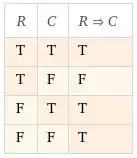In a recent answer to a question about material implication and vacuous truths, I wrote:
The word "if" has two different meanings. The meaning that's used in mathematical writing is different from the meaning that's used in everyday English.
In mathematical writing, the phrase "if X, then Y" is defined as meaning "either not-X, or Y." Whenever this definition conflicts with the everyday meaning of the word "if," we disregard the everyday meaning and use this definition instead.
However, I was a little surprised to receive a comment stating, "I strongly disagree with the first paragraph of this answer" (which is the first paragraph quoted above.) Judging by the number of upvotes I see on the comment, there are at least three people who disagree with me on this point, so now I'm wondering if I was mistaken in my original claim.
My current belief is that in mathematical writing, the word "if" denotes material implication, but in everyday English, it does not. Am I right about that? If not, which part am I wrong about and why?
(Note that I'm not claiming that the idea of material implication is wrong in any way; what I am claiming is that material implication and the everyday meaning of the word "if" are not identical to each other.)
For what it's worth, I find the following thought experiment to be a convincing argument that in everyday English, the word "if" does not refer to material implication.
In the fictional land of Fictionlandia, a notorious con artist named Ruth Roe sets up a stand selling elixirs. She makes all sorts of promises about her elixirs to passersby: "If you drink this, your hair will grow back tomorrow!" "If you drink this, your cataracts will clear up instantly!" "If you drink this, you will be immune to all types of poison forevermore!" However, nobody ever buys any of the elixirs, and at the end of each day, Ruth pours them all out in the street.
Eventually, one Jennifer Doe has had enough, and takes Ruth to court for false advertising. In her own defense, Ruth argues that every statement she made was completely true. After all, nobody ever drank the elixir! Since the antecedent of each of her claims (namely, "you drink this") turned out to be false, that means that each of her claims was a 100% true statement.
Jennifer says that Ruth's argument is nonsense, and that if some liquid has no cataract-healing properties, then the statement "If you drink this, your cataracts will clear up instantly" is false regardless of whether or not anyone actually drinks the liquid.
I think (but I'm not certain) that most of us would agree with Jennifer's argument, not Ruth's.
